Firearms and Ammunition
Special arrangements exist for the transportation of firearms and ammunition for a fee. Written notification and approval must be received by the passenger or agency representative at least 48 hours before the departure time.
Each firearm should be secured and empty packed in a carrying case with special lock.
Sporting ammunition up to a maximum of 5 kg per passenger is allowed. Ammunition must be packaged separately from the firearm in a tough container. Ammunition and gunpowder containing explosive or flammable projectiles may not be carried on board under any circumstances.
Restrictions
As MGA, we work for caring about safety and comfort of passengers on flight.
According to International standards some items listed at below can be carried by passengers. In order to international flight rules, some dangerous goods are not transported during the flight. Therefore, carrying these prohibited items during flight will not acceptable at all.
The following list show that non-prohibited and prohibited items on the flight.
| Items taht may be carried by passengers | Checked Baggage | Carry On Baggage | On Person | Symbol |
|---|---|---|---|---|
| Alcoholic beverages with an alcohol content of more than 24% but less than 70% Alcoholic beverages can be carried as long as the total net quantity per passenger does not exceed 5 liters and alcoholic beverages are in containers that do not exceed 5 liters. | N/A | |||
| Ammunition, securely packaged In quantities not exceeding 5 kg gross weight per person for that person’s own use. Allowances for more than one person must not be combined into one or more packages. | N/A | |||
| Avalanche rescue backpack One(1) per person, containing cartridges of compressed gas in Div. 2.2. May also be equipped with a pyrotechnic trigger mechanism containing no more than 200 mg net of Div. 1.4S. The backpack must be packed in such a manner that it cannot be accidentally activated. The airbags within the backpacks must be fitted with pressure relief valves.(Approval is required.) | N/A | |||
| Baggage with installed lithium batteries*non-removable batteries. Batteries must contain no more than 0.3 g lithium metal or for lithium ion must not exceed 2.7 Wh; removable batteries. Batteries must be removed if baggage is to be checked. Removed batteries must be carries in the cabin. | N/A | |||
| Security-type equipment (see IATA DGR 2.3.2.6 for details). (Approval is required.) | N/A | |||
| Drones with lithium batteries preserved or separated (Approval is required.) | N/A | |||
| Specimens, non-infectious Packed with small quantities of flammable liquid, must meet A180 (see IATA DGR 2.3.5.11 for details). | N/A | |||
| Thermometer, medical or clinical, Which contains mercury, one (1) per person for personal use, when in its protective case. | N/A | |||
| Thermometer or barometer, mercury filled Carried by a representative of a government weather bureau or similiar official agency (see IATA DGR 2.3.3.1 for details). (Approval is required.) (The pilot-in-command must be informed of the location) | N/A | |||
| Non-radioactive medicinal or toiletry articles (including aerosols) such as hair sprays, perfumes, colognes and medicines containing alcohol; and Non-flammable, non-toxic (Division 2.2) aerosols, with no subsidiary hazard, for sporting or home use (see IATA DGR 2.3.5.1). The total net quantity of non-radioactive medicinal or toiletry articles and non-flammable, non-toxic (Division 2.2) aerosols must not exceed 2 kg or 2 L and the net quantity of each single article must not exceed 0.5 kg or 0.5 L. Release valves on aerosols must be protected by a cap or other suitable means to prevent inadvertent release of the contents. | N/A | |||
| Radioisotopic cardiac pacemakers Or other devices, including those powered by lithium batteries, implanted into a person or fitted externally. | N/A | |||
| Permeation devices, Must meet A41 (see IATA DGR 2.3.5.13 for details) | N/A | N/A | ||
| Oxygen or air, gaseous, cylinders Required for medical use. The cylinder must not exceed 5 kg gross weight (Approval is required.) (The pilot-in-command must be informed of the location). Note: Liquid oxygen systems are forbidden for transport. | ||||
| Mobility Aids: Battery-powered wheelchairs or other similiar mobility devices with non-spillable wet batteries, nickel-metal hydride batteries or dry batteries, (see IATA DGR 2.3.2.2). (Approval is required.) (The pilot-in-command must be informed of the location) | N/A | |||
| Mobilite Aids: Battery-powered wheelchairs or other similiar mobility devices with spillable batteries or with lithium ion batteries (see IATA DGR 2.3.2.3 and 2.3.2.4 for details). (Approval is required.) (The pilot-in-command must be informed of the location) | N/A | |||
| Mobilite Aids: Battery-powered wheelchairs or other similiar mobility devices with lithium ion batteries where the battery is specifically designed to be removed, the battery must be carried in the cabin (see IATA DGR 2.3.2.4.3(b)2. for details).. (Approval is required.) (The pilot-in-command must be informed of the location) | N/A | |||
Matches, safety (one small packet) or a small cigarette lighter
| N/A | |||
| Chemical Agent Monitoring Equipment, When carried by staff members of the Organization for the Prohibition of Chemical Weapons on official travel (see IATA DGR 2.3.4.4) (Approval is required.) | N/A | |||
Lithium Batteries:Portable electronic devices (PED) containing lithium metal or lithium ion cells or batteries,
| N/A | |||
| Lithium batteries, spare/loose, including power banks, see Batteries, spare/loose | N/A | |||
| Lithium battery-powered electronic devices Lithium ion batteries for portable (including medical) electronic devices, a Wh rating exceeding 100 Wh but not exceeding 160 Wh. For portable medical electronic devices only, lithium metal batteries with a lithium metal content exceeding 2 g but not exceeding 8 g. Devices in checked baggage must be completely switched off and must be protected from damage. (Approval is required.) | N/A | |||
| Lithium batteries, spare/loose With a Watt-hour rating exceeding 100 Wh but not exceeding 160 Wh for consumer electronic devices and PMED or with a lithium metal content exceeding 2 g but not exceeding 8 g for PMED only. Maximum of two spare batteries in carry-on baggage only. These batteries must be individually protected to prevent short circuits. (Approval is required.) | N/A | |||
| Internal combustion or fuel cell engines, Must meet A70 (see IATA DGR 2.3.5.12 for details). | N/A | |||
| Gas cartridges, small, non-flammable Containing carbon dioxide or other suitable gas in Division 2.2. Up to two (2) small cartridges fitted into a self-infliating personal safety device, intended to be worn by a person, such as a life jacket or vest. Not more than two (2) devices per passenger and up to two (2) spare small cartridges per device, not more than four (4) cartridges up to 50 mL water capacity for other devices (see IATA DGR 2.3.4.2) (Approval is required.) | N/A | |||
| Insulated packagings containing refrigerated liquid nitrogen (dry shipper), fully absorbed in a porous material containing only non-dangerous goods. | N/A | |||
| Hair styling equipment containing a hydrocarbon gas cartridge, Up to one (1) per passenger or crew-member, provided that the safety cover is securely fitted over the heating element. This hair styling equipment must not be used on board the aircraft. Spare gas cartridges for much hair styling equipment are not permitted in checked or carry-on baggage. | N/A | |||
| Gas cylinders, non-flammable, non-toxic Worn for the operation of mechanical limbs. Also, spare cylinders of a similiar size if required to ensure an adequate supply for the duration of the journey. | N/A | |||
| E-cigarettes (including e-cigars, e-pipes, other personal vaporizers) containing batteries must be individually protected to prevent accidental activation (see IATA DGR 2.3.5.8.2) | N/A | |||
| Fuel cells Containing fuel, powering portable electronic devices (e.g. cameras, cellular phones, laptop computers and camcorders), see IATA DGR 2.3.5.9 for details. | N/A | |||
| Fuel cell cartridges, spare for portable electrnoic devices, see IATA DGR 2.3.5.9 for details. | N/A | N/A | ||
| Dry Ice (carbon dioxide, solid) In quantites not exceeding 2.5 kg per person when used to pack perishables not subject to these Regulations in checked or carry-on baggage, provided the baggage (package) permits the release of carbon dioxide gas. Checked baggage must be marked "dry ice" or "carbon dioxide, solid" and with the net weight of dry ice or an indication that there is 2.5 kg or less dry ice. (Approval is required.) | N/A | |||
| Batteries, spare/loose, Including lithium batteries, non-spillable batteries, nickel-metal hydride batteries and dry batteries (see IATA DGR 2.3.5.8) for portable electronic devices must be carried in carry-on baggage only. Articles which have the primary purpose as a power source, e.g. power banks are considered as spare batteries. These batteries must be individually protected to prevent short circuits. Lithium metal batteries: the lithium metal content must not exceed 2 g (see IATA DGR 2.3.5.8.4) Each person is limited to a maximum of 20 spare batteries. Lithium ion batteries: the Watt-hour rating must not exceed 100 Wh (see IATA DGR 2.3.5.8.4) Note: The operator may approve the carriage of more than 20 batteries. Non-spillable batteries: must be 12 V or less and 100 Wh or less. Each person is limited to a maximum of 2 spare batteries (see IATA DGR 2.3.5.8.5) | N/A | |||
| Camping stoves and fuel containers that have contained a flammable liquid fuel, With empty fuel tank and/or fuel container (see IATA DGR 2.3.2.5 for details). (Approval is required.) | N/A |
| Prohibited Items | Image |
|---|---|
| Devices containing liquid oxygen | 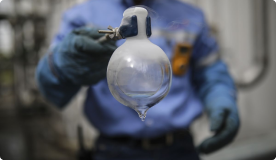 |
| Guns, firearms and other devices that discharge projectiles (Pistols, rifles, toy guns comparable to real guns, flare pistols, harpoon guns, bows and arrows, slingshots and catapults) |  |
| Objects with a sharp point or sharp edge (Items designed for chopping, such as axes, hatchets and cleavers, razor blades,box cutters, scissors with blades of more than 6 cm as measured from the fulcrum, martial arts equipment with a sharp point or sharp edge, swords and sabers) |  |
| Workmen’s tools (Crowbars, cordless portable power drills and drill bits, screwdrivers, chisels, cordless portable power saws) | 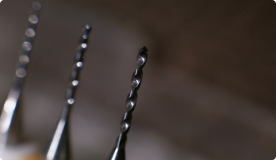 |
| Blunt instruments Baseball and softball bats, clubs and batons, such as billy clubs, blackjacks, martial arts equipments) |  |
| Baggage with installed lithium batteries Non-removable batteries exceeding -0.3g lithium metal or 2.7 Wh. | 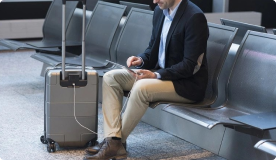 |
| Electro shock weapons (e.g. Tasers) containing dangerous goods such as explosives, compressed gases, lithium batteries, etc. are forbidden in carry-on baggage or checked baggage or on the person. | 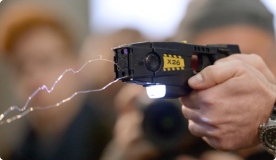 |
| Security-type attaché cases, cash boxes, cash bags, Etc. incorporating dangerous goods, such as lithium batteries and/or pyrotechnic material. | 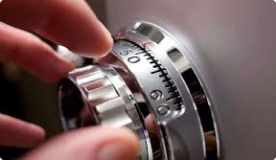 |
| Disabling devices | 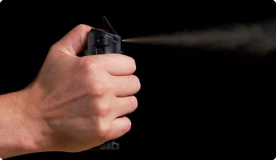 |
| Personal motorised vehicles (Hoverboard, electric skateboards, smart wheeled devices that can provide self-balance) |  |
| Explosives and incendiary substances and devices (Fireworks, sparklers, flares, firecrackers, ammunition, mines, grenades, dynamite, explosives containing gunpowder) | 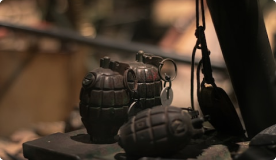 |